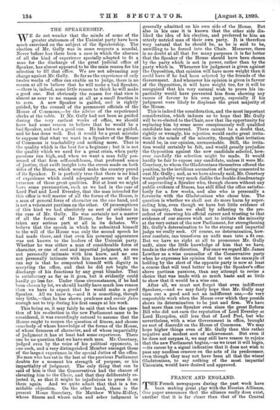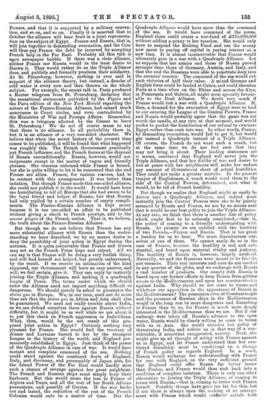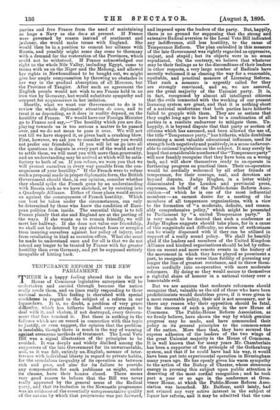FRANCE AND ENGLAND. T HE French newspapers during the past week
have been making great play with the Russian Alliance. One paper announces that the alliance really does exist, another that it is far closer than that of the Central Powers, and that it is supported by a military conven- tion, and so on, and so on. Finally it is asserted that in October the alliance will bear fruit in a joint representa- tion on the subject of Egypt. France and Russia, that is, will join together in demanding evacuation, and the Czar will thus pay France the debt he incurred by accepting French help in the Far East. Probably all this talk is rape newspaper babble. If there was a clear alliance, neither France nor Russia would in the least desire to disown it. They would. rather do as the Triple Alliance does, and publicly and formally proclaim their solidarity. At St. Petersburg, however, nothing is ever said. in support of the affiance theory, but instead, a douche of cold water is every now and then thrown on the whole subject. For example, the recent talk in Paris produced a Reuter telegram from St. Petersburg, declaring that the sensational statements published by the Figaro and the Paris edition of the New York Herald regarding the nature of the Franco-Russian Alliance, had caused much annoyance in Court circles, and were contradicted by the Ministries of War and Foreign Affairs. Remember, this was a telegram allowed by the Censor to leave St. Petersburg We do not of course mean to say that there is no alliance. In all probability there is, but it is an alliance of a very one-sided character. We believe that when the secret history of the present time comes to be published, it will be found that what happened was roughly this. The French Government practically put French influence and the French forces at the disposal of Russia unconditionally. Russia, however, would not reciprocate except in the matter of vague and friendly phrases. She remains unbound while France is bound, but she is quite willing to let it be rumoured that she and France are allies. France, for various reasons, had to be content with this arrangement. It was better than isolation. But though France made this one-sided alliance, she could not publish it to the world. It would have been too humiliating to tell all Europe that she had sworn to be the loyal friend and helper of Russia, but that Russia had only replied by a certain number of empty compli- ments. The Franco-Russian Alliance is kept secret because it is too one-sided an affair to be published without giving a shock to French prestige, and to the amour propre of the French nation. That is, we believe, the truth about the Franco-Russian Alliance.
But though we do not believe that France has any more substantial alliance with Russia than the under- standing we have described, we by no means desire to deny the possibility of joint action in Egypt during the autumn. It is quite conceivable that France and Russia may act as the French Press hope and expect. All we can say is that France will be doing a very foolish thing, and will find herself not helped, but greatly embarrassed, by the result. If we receive an intimation of the kind supposed, our Government will have an easy answer, and will, we feel certain, give it. They can reply by instantly joining the Triple Affiance, and making it a quadruple league of Peace. The terms under which we should enter the Alliance need not import anything difficult or dangerous. We should merely be asked to guarantee the status quo in Europe, We, in our turn, need not do more than ask that the status quo in Africa and Asia shall also be guaranteed. We need not really trouble about India, as we can defend ourselves there against Russia without difficulty, but it might be as well while we are about it to put this check on French aggression in Indo-China. What, then, would be the net result of this pro- posed joint action in Egypt ? Certainly nothing very pleasant for France. She would find the recovery of Alsace and Lorraine barred to her by the strongest League in the history of the world, and England per- manently established in Egypt. Just think of the power of the Quadruple Alliance in case of war. It would have instant and complete command of the sea. Nothing could stand against the combined fleets of England, Italy, and Germany, and presumably of Japan also, for the Island Power of the Far East would hardly miss such a chance of revenge against her great neighbour. The French and Russian ships must simply keep their harbours. But this would mean the loss to France of Algiers and Tunis, and all the rest of her North African possessions, and possibly of Corsica. If the war broke out and lasted, the reduction of the rest of the French Colonies would only be a matter of time. But the Quadruple Alliance would have more than the command of the sea. It would have command of the purse. England alone could create a war-fund of .R250,000,000 without adding a penny to her taxation. She would only have to suspend the Sinking Fund and use the money now spent in paying off capital in paying interest on a new loan. It is almost inconceivable that France would ultimately gain in a war with a Quadruple Alliance. Let us suppose that her armies and those of Russia proved stronger than those of Germany, Austria, and Italy, and that she and the Russians were able to penetrate deep into the enemies' country. The command of the sea would rob such victories of half their value. A mixed German and English force could be landed at Calais, and could threaten Paris at a time when on the Rhine and across the Alps, in Pomerania and Galicia, all might seem specially favour- able to the Dual Alliance. We doubt very much if France would risk a war with a Quadruple Alliance. If, then, a demand for the evacuation of Egypt were to lead to our entering the League of the Central Powers, France and Russia would probably agree that the game was not worth the candle, at any rate at that moment, and would prefer to pocket the humiliation of our refusal to evacuate Egypt rather than rush into war. In other words, France, by demanding evacuation, would fail to get it, but would get instead a Quadruple instead of a Triple Alliance. Of course, the French do not want such a result, but at the same time we do not feel sure that they may not bring it about. Their leading statesmen are it seems, convinced that England. will never join the Triple Alliance, and that her dislike of war and desire to live at peace with her neighbours will make her endure any amount of ill-treatment short of actual hostilities. They could not make a greater mistake. In the present temper of Englishmen, a touch would send them to the side of the Central Powers, determined, cost what it would, to be rid of French hostility.
But though we realise that England might so easily be driven into a Quadruple Alliance, and indeed must instantly join the Central Powers were she to be jointly menaced by Russia and France, we are by no means sure that it would be our best policy to join the Triple Alliance. At any rate, we think that there is another line of policy which ought first to be seriously considered,—that is, the policy of coming to a friendly understanding with Russia. At. present we are saddled with the hostility of two Powers,—France and Russia. That is too great a burden for us to bear. We must disembarrass our- selves of one of them. We cannot easily do so in the case of France, because the hostility is real and sub- stantial, and based upon material rivalry and jealousy. The hostility of Russia is, however, largely artificial. Naturally, we and the Russians were meant to be friends, not enemies. Their real interests and ours do not conflict in any quarter of the globe, and we exchange with Russia a vast number of products. Our enmity with Russia is based upon our former efforts to keep Russia from getting access to the Mediterranean and upon her counter-strokes against India. Why should we not come to terms and withdraw our opposition to the appearance of Russia in the Mediterranean? The possession even of Constantinople and the presence of Russian ships in the Mediterranean would in the long run be more dangerous and disturbing to France than to us, for France is much more deeply interested in the Mediterranean than we are. But if our embargo were taken off Russia's advance to the open water, Russia would be clearly willing to come to .terms with us in Asia. She would abandon her policy of threatening India, and relieve us in that way of a con- siderable, if somewhat exaggerated, anxiety. Next, she might give up all thought of acting with France against us in Egypt, and let France understand that her con- tinued friendship must be conditional on a change of French policy as regards England. In a word, Russia would exchange her understanding with France for one with England, on the very sufficient ground that England could offer Russia far better terms than France, and France would thus sink back into a condition of complete isolation. There is only one other alternative to joining the Triple Alliance, or coming to terms with Russia,—that is, coming to terms with France herself. Possibly things have gone too far for this, but if not there is always open the making of an arrange- ment with France which would nerfectly satisfy both parties and free France from the need of maintaining so huge a Navy as she does at present. If France were governed, by reason instead of sentiment and jealousy, she would make terms with England. She would then be in a position to cement her alliance with Russia., and possibly might some day come to Germany with a demand for the restoration of the Provinces, which could not be withstood. If France acknowledged our right to the whole Nile Valley, including Egypt, came to terms with us on the Niger and the Mekong, and allowed her rights in Newfoundland to be bought out, we might give her ample compensation by throwing no obstacles in her way in the gradual absorption of all Morocco, but the Province of Tangier. After such an agreement the English people would not wish to see France held in an iron vice by Germany, but would substitute sympathy and support for acquiescence in her isolation.
Shortly, what we want our Government to do is to review the whole diplomatic situation de novo, and to treat it as depending, as it does in reality depend, on the hostility of France. We would have our Foreign Minister go to France and say,—" The hostility which you are dis- playing towards WI is too serious a matter to be passed over, and we do not mean to pass it over. We will not rest till we have stopped it, or given back a crushing blow. First, however, we ask you to consider whether you would not prefer our friendship. If you will let us go into all the questions in dispute in every part of the world and try to settle them, we will meet you with more than generosity, and an understanding may be arrived at which will be satis- factory to both of us. If you refuse, we warn you that we will protect ourselves in every way possible from the con- sequences of your hostility." If the French were to refuse such a proposal made in proper diplomatic form, the British Government should then, in our opinion, consider whether they should spike the French guns by an understanding with Russia such as we have sketched, or by entering into a Quadruple Alliance. Either of these plans would secure us against the consequences of French hostility. Which can best be taken under the circumstances, can only be determined by those who know the condition of Euro- pean politics from inside. The essential thing is to tell France plainly that she and England are at the parting of the ways. If she wants us to remain friendly, we will meet her halfway. If she does not value our friendship, we shall not be deterred by any abstract fears or scruples from insuring ourselves against her policy of injury, and from retaliating in kind as occasion offers. What she must be made to understand once and for all is that we do not intend any longer to be treated by France with far greater hostility than even Germany, and yet be supposed entirely incapable of hitting back.




































 Previous page
Previous page